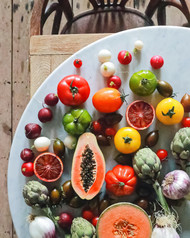The gut friendly diet is all about nourishing your gut microbiome, to promote optimal gut health.
For those who don’t know, the gut microbiome is an intricate ecology of microorganisms that resides in the gastrointestinal tract and is essential for overall health and well-being. And diet plays a significant role in influencing the composition and diversity of this intricate ecology.
Eating The Rainbow
One simple method to take on board to help promote a healthy gut microbiome, is to Eat the Rainbow. Eating a range of colourful fruits and vegetables delivers an assortment of nutrients and phytochemicals that can promote the growth of good gut bacteria. For instance, red fruits and vegetables such as tomatoes and red bell peppers contain lycopene, a potent antioxidant with anti-inflammatory effects in the gut (1). And, green leafy vegetables such as spinach and kale are rich in vitamin K and lutein, which have been associated with enhanced gut health (2).
Fermented Foods
In addition to this, including fermented foods into your diet is another way to promote a healthy gut microbiome. Authentic, fermented foods are rich in live cultures, which are beneficial bacteria that reside in your gut. These beneficial bacteria, can help populate and diversify your gut microbiome, thereby improving its equilibrium.
A simple add on to your diet, can be an authentic kombucha! Authentic Kombucha, is a fermented tea brewed with a symbiotic culture of yeast and bacteria (SCOBY). This fermentation process, increases the number live cultures present, making it a simple, yet effective choice to help improve digestive health (3).
Authentic kombucha that is fermented properly, like Pure Booch, with simple, natural ingredients and no artificial sweeteners, are the type of Kombucha you want to look out for. They are rich in polyphenols that have been shown to behave as prebiotics, or the food the bacteria feed on, helping them populate and thrive in your gut (4). On the other hand, sweeteners and artificial flavours, have been shown to have a negative influence on gut health overall.
Avoiding Processed Foods
Finally, in addition to consuming a range of fruits and vegetables and fermented foods, it is essential to minimise your consumption of highly processed foods. Foods that have been altered from their original form, often containing added sugars, salt, and artificial ingredients. These foods can include processed snacks, frozen meals, and fast food and are foods associated with an increased risk of gastrointestinal illnesses such as irritable bowel syndrome and inflammatory bowel disease (5).
In conclusion, a gut-friendly diet promotes good gut health by nourishing the gut flora. Eating the colours of the rainbow, consuming fermented foods such as authentic kombucha, and minimising your consumption of overly processed foods are all excellent methods to help you on your journey to a healthy gut.
Discover the full range of Pure Booch Kombucha
References:
(1) Rossi M, et al. "Tomato lycopene and inflammatory bowel disease: a systematic review and meta-analysis." Nutrients. 2015; 7(8): 6608-6628.
(2) Kim Y, et al. "Lutein and vitamin K contents in green leafy vegetables and their bio accessibilities." J Agric Food Chem. 2013; 61(13): 3141-3146.
(3) Jayabalan R, Malbaša RV, Lončar ES, Vitas JS, Sathishkumar M. A Review on Kombucha Tea-Microbiology, Composition, Fermentation, Beneficial Effects, Toxicity, and Tea Fungus. Compr Rev Food Sci Food Saf. 2014 Jul;13(4):538-550. doi: 10.1111/1541-4337.12073. PMID: 33412713.
(4) Plamada D, Vodnar DC. Polyphenols-Gut Microbiota Interrelationship: A Transition to a New Generation of Prebiotics. Nutrients. 2021 Dec 28;14(1):137. doi: 10.3390/nu14010137. PMID: 35011012; PMCID: PMC8747136.
(5) David LA, Maurice CF, Carmody RN, Gootenberg DB, Button JE, Wolfe BE, Ling AV, Devlin AS, Varma Y, Fischbach MA. Diet rapidly and reproducibly alters the human gut microbiome. Nature. 2013; 505: 559–63

